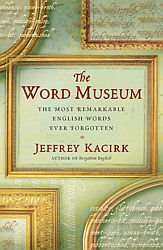 I ran across The Word Museum: The Most Remarkable English Words Ever Forgotten, by Jeffrey Kacirk, in the free swap rack at my local library. I knew almost immediately that I would enjoy browsing this collection of words that the author says were partly chosen for their "Jabberwocky factor" -- basically, how they sound and the images they bring to mind.
I ran across The Word Museum: The Most Remarkable English Words Ever Forgotten, by Jeffrey Kacirk, in the free swap rack at my local library. I knew almost immediately that I would enjoy browsing this collection of words that the author says were partly chosen for their "Jabberwocky factor" -- basically, how they sound and the images they bring to mind.As I read, though, it was the social and historical glimpses that many of the words provided that really struck me, and I did start wishing for a little more depth (like Michael Quinion provides in Ballyhoo, Buckaroo, and Spuds). Quinion's site (oooh, and I see he has a new book - Gallimaufry - coming out soon!) really provide that in spades, which I appreciate. Kacirk's book is less research and more "check this fun stuff out", which is sometimes just what you want in a book, especially if you're reading it in the bathroom while your 4 year old splashes in the tub.
Anyway, in his introduction, Kacirk mentions that "teachers and historians, because of their socially prescribed curricular attention toward larger social concepts, often bypassed the smaller and more personal expressions of social custom and conduct" (p. 8). While I don't think that is a fair description of many good teachers or historians (or archaeologists, for that matter), it is undeniably true that the watered-down version of history that many grade school or high school students get fed in the US is de-personalized, over-generalized, and, well, boring. This book is not boring.
Since I've been reading a lot of women's history and feminist theory lately (not as boring as it sounds, dammit!), I took special notice of the words - especially the perjorative ones - in Kacirk's book that were historically applied to women. I thought it was interesting how most of these archaic terms described sexual behavior, uppity-ness, or laziness, which all come together in some feminine stereotypes. These words tell us a little bit about control (and the lack of control) that men had over women in England and Scotland in centuries past:
batterfanged - basically, to be beaten and scratched, and Kacirk adds as by "a termagant". Now there's an interesting word, too, right up there with virago. Check out the bizarre origin of termagant.
clapperclaw - to tongue-beat; to scold. To scratch, maul, fight in an unskillful manner; generally used of women. Hence, a clapperclaw is a noisy woman.
cover-slut - a long apron used to hide an untidy dress (or something in general that hides sluttishness).
curtain-lecture - A reproof given by a wife to her husband in bed. Yes, high-class beds used to have curtains around them.
fishfag - "any scolding, vixenish, foul-mouthed woman". Check out this blogger's description of Ann Coulter that uses fishfag along with many of this book's other entertaining words. It's an interesting twist on the more well-known "fishwife".
giggle-trot - a woman who marries late in life is said to "take the giggle-trot".
idle-worms - worms that breed in the fingers of lazy girls.
laced-mutton - a prostitute (as used in The Two Gentlemen of Verona). Also rigmutton. Some graduate student somewhere has probably written a paper on the symbolism of these comparisons with sheep.
married all over - used to describe women who "fall off in their appearance and become poor and miserable-looking" after marriage. The historic equivalent of "letting yourself go". Check out this Good Housekeeping quiz on how to discover if you're on "the fast track to Frumpville". There's a similar quiz on Oprah's site. Give me a break. Some things really haven't changed in centuries. Which leads us right to the last definition:
shachled-shoes - a no longer useful person, especially "a woman discarded by her lover". Shachled is an old Scottish term meaning distorted and no longer holding its shape. Ouch. So much for "the good old days".
Tags:
1 comment:
Oops. another try to provide a linke for Sacrificing Ourselves for Love: http://ourbodiesourselves.org/publications/sofl.asp
I wish I could edit my own comments.
Post a Comment